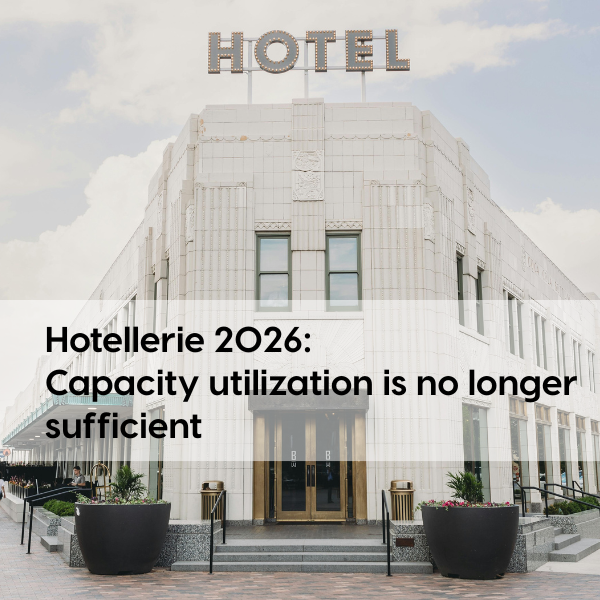Financial management
7 financial mistakes in hotels — and how to avoid them
How to strengthen the financial basis of your hotel
%20(1).png)
Increasing costs, a shortage of skilled workers, volatile markets — many current challenges in the hotel industry have a direct impact on the financial stability of a company. It is therefore all the more important to avoid typical mistakes in financial management and to make well-founded decisions. In this article, you will learn which seven financial stumbling blocks hotels regularly encounter — and how you can address them with practical approaches and digital tools such as profits.
Clarity creates control: Why numbers make the difference
In the hotel industry, many decisions have to be made every day — from pricing to staffing to investments. At the same time, the requirements for profitability and planning security are increasing: increased costs, volatile demand and increasing competition require a precise understanding of one's own financial position.
In everyday operations, however, there is often little time left to deal with evaluations, forecasts or profitability issues in a structured manner. Yet it is precisely this information that makes the difference — between responding quickly and actively managing.
This article shows seven typical mistakes in financial planning and management that can often be observed in practice. You will receive specific recommendations for prevention — partly directly implementable, partly supported by digital solutions such as Profitze. The aim is to show how you can make financial decisions even more specifically and with greater clarity — for an economically stable and sustainable hotel business.
1. Investment decisions without an audit
Many investments are made on the basis of aesthetics or wishful thinking — without systematic review of whether they are economically viable.
recommendation:
Prepare an amortization statement before making major purchases. Ask yourself three questions:
- What additional turnover is realistic?
- What savings are achieved?
- When is the investment covered?
💡 Note:
Investments are justified by their contribution to sustainable value creation — not by pure intuition.
2. Lack of relationship between staff deployment and guest utilization
Staff deployment planning is often carried out according to fixed patterns — regardless of how many guests are actually expected.
Profitable solution:
The platform analyses historical data, current booking situation and seasonal patterns and provides precise recommendations for staffing requirements — on a daily basis, cost-conscious and well-founded in business administration.
💡 Note:
Targeted personnel deployment reduces costs, protects employees from overwork and stabilizes service quality.
3. No reliable lower price limit in direct sales
Room prices are often defined based on market or sentiment — there is no knowledge of at what point a booking becomes unprofitable.
recommendation:
Calculate your absolute price floor taking into account all variable costs (e.g. commissions, cleaning, breakfast, energy). This creates a reliable basis for decision-making on price campaigns or discount scales.
💡 Note:
Only those who know their lower price limit can effectively convert sales into income.
4. Lack of cost controlling in real time
Many hotels recognize too late when the use of goods, energy or personnel costs develop negatively — usually only during the monthly evaluation.
Profitable solution:
The system automatically and in real time shows deviations from planned values, recognizes outliers and suggests options for action. You are always in control of your results.
💡 Note:
Continuous cost monitoring is the basis for reliable business management.
5. No structured liquidity planning
Many companies focus on turnover or profit — and overlook the fact that solvency is the decisive factor for stability.
recommendation:
Realistically plan monthly deposits and withdrawals. Consider booking seasonals, tax deadlines, and investment plans. This is how you avoid liquidity bottlenecks.
💡 Note:
Liquidity is the foundation of every economically healthy company — regardless of accounting results.
6. No standardized comparability of performance
Without structured reports and comparative figures (e.g. with respect to the previous year or budget), it is hardly possible to objectively classify economic development.
Profitable solution:
You receive automated monthly comparisons — for example of workload, turnover, use of goods or GOP — with clear visualizations and optional operational comparison.
💡 Note:
Transparency is achieved through comparison — this is the only way you can identify trends, weaknesses and potential.
7. Failure to derive specific measures from key figures
Even when key figures are available, no concrete measures are often derived from them — reports remain theory.
recommendation:
Hold a short controlling meeting every month. Objective: a maximum of three measures derived directly from figures. This creates a connection between analysis and operational implementation.
💡 Note:
Business knowledge only develops its economic benefits through consistent implementation.
Structure beats gut feeling
In today's hotel industry, it is not only the quality of service that counts, but also the quality of control. Hotels that are economically successful combine guest orientation with a clear understanding of figures. The approaches presented will help you to strategically position yourself better, minimize sources of operational errors and systematically increase profitability.
profitize supports you with intelligent evaluations, practical recommendations, forecasts and a user-friendly platform — developed specifically for the requirements of the hotel industry.
Oder kontaktieren Sie uns.
Simply contact us via email. We look forward to hearing and reading from you.
hello@profitize.io

.png)

.png)
.png)
.png)
.png)
.png)
.png)
.png)

.png)
.png)
.png)
.png)
.png)
.png)
.png)
.png)
.png)
.png)

.png)
.png)
.png)
.png)
.png)

.png)
.png)
.png)


.png)
.png)
%20(600%20x%20400%20px).png)
%20(800%20x%20600%20px).png)

.png)



.png)



